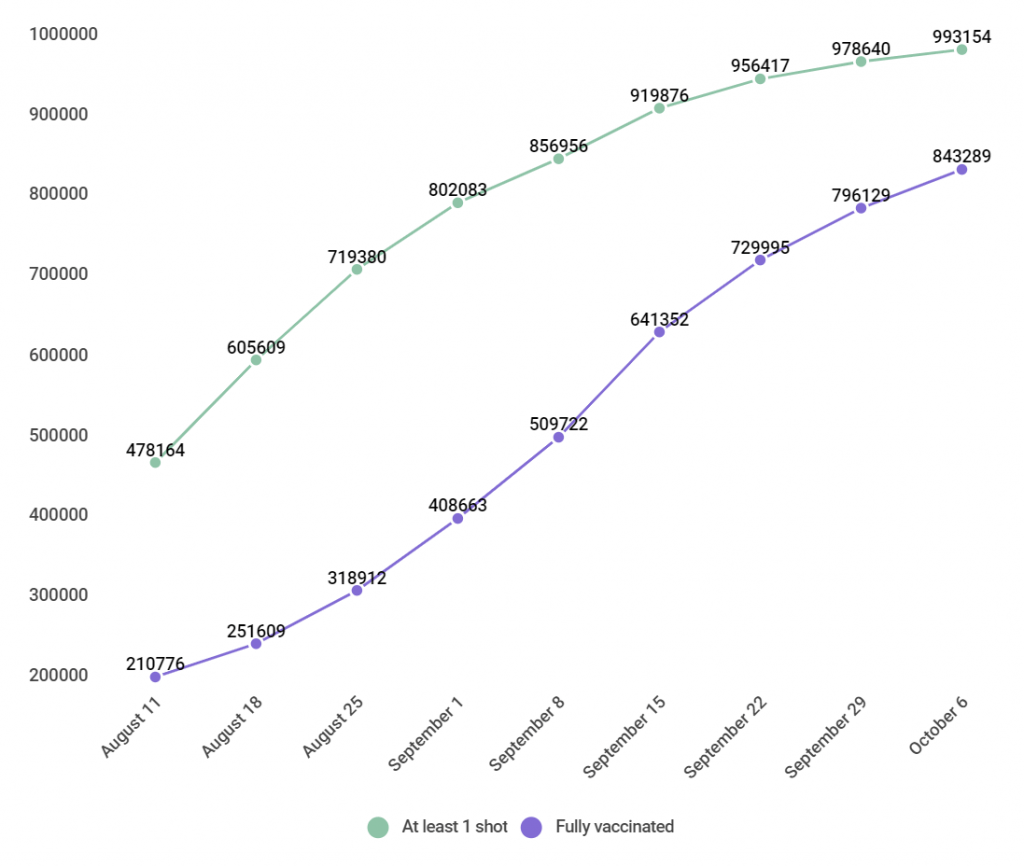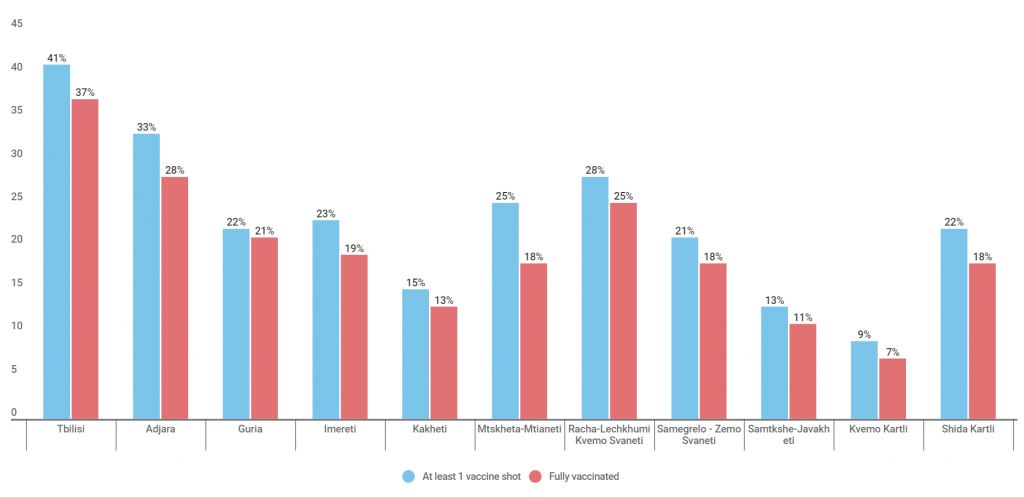Georgia Struggles to Reverse Stalled Vaccination
Georgian public health authorities have been facing criticism as the country has struggled – and largely failed – to keep the COVID-19 vaccination pace over the past weeks. In the meantime, disagreements among top health officials on how to reverse the stagnated process become apparent.
Upon launching the immunization against the novel coronavirus in mid-March, the health authorities were planning to vaccinate 60% of the grown-up population (about 1,7 mln. out of 2,841,132) by the end of 2021.
Despite the initial slow start, the vaccination picked up the pace in the months of summer, as more vaccines from various manufacturers became available. The rapid spread of the “Delta variant” of Covid-19 also prompted Georgians to take the virus more seriously. In July, Georgia allowed Pfizer-BioNTech jabs for 16 and 17 years olds as well.
But the attained pace of vaccination – with over 20,000 daily shots – turned out to be short-lived: 8,331 jabs were administered nationwide on Thursday, October 7, with only 1,668 persons receiving their first shot.
As of October 10, 1,000,102 Georgians (35.2% of the grown-up population, age group 18≥), had received at least one dose, while 871,014 persons (30.5% of the grown-up population) were fully vaccinated – around half of the annual target. The downtrend comes against the government’s expectations in August to have vaccinated up to 2 million persons by the end of September.

Top Officials at Odds Over Vaccine Mandates
Over the past weeks, top public health professionals started considering vaccine mandates, saying the vaccination campaign alone was unlikely to revive the stalled process.
In a public opinion survey published by the National Democratic Institute (NDI) in August, 47% of respondents said they will not get vaccinated, with the vaccine hesitancy highest – 56% – among younger adults (18-34 age group).
Amiran Gamkrelidze, Head of National Center for Disease Control, the key public health institution, told Georgian Public Broadcaster on September 20 that his agency “fully supports” introducing vaccine mandates for certain professional groups, with healthcare workers and school teachers coming first. As of October 7, up to 65% of school personnel had reportedly received at least a single shot.
“There is, however, no consensus at this time,” NCDC Head noted, adding that “the majority of the public prefers [the vaccination] to be voluntary.”
In response to public inquiries, Public Defender Nino Lomjaria argued back in August that, having studied international practices and national legislation, “in certain fields of public life” the obligation to present proof of vaccination, if well-founded, “does not amount to a discriminatory or rights-violating practice.”
Despite strong backing from some agencies, however, the issue failed to find broad support among Georgian authorities, with the Ministry of Health sticking to free choice.
“Medical intervention [vaccine] cannot be mandatory under any condition,” said Deputy Health Minister Tamar Gabunia in October 7 press briefing, but suggested certain requirements can be introduced in business environments or public agencies for safety purposes. These, however, have to “necessarily” give the possibility of choice, Gabunia went on, substituting vaccination with periodical COVID-19 testing, the requirement for wearing face masks, recovery from virus, etc. Asked about the failure to agree on the positions with the Ministry, Gamkrelidze quipped “no comment.”
Searching for Alternatives as Cases Rise Again
Instead, authorities plan to intensify the vaccination campaign, including through a “marathon” of health professionals to reach out to 49 larger villages nationwide. The Ministry has been also pondering financially incentivizing doctors and nurses who reassure the risk groups (60≥) to get their jabs.
The efforts so far proved uneven: comparing the regions, the residents of Tbilisi, the capital city, have demonstrated the highest vaccination willingness by October 10. More ethnically mixed regions such as Kakheti, Kvemo Kartli, or Samtkshe-Javakheti, appeared most skeptical – perhaps pointing at the flaws in vaccination campaign content, its reach, or both.

After the country went through a heavy summer peak of infections with 4-6 thousand in daily cases for weeks, the numbers of infections started to decline in September. However, on October 7, Gamkrelidze said he was worried about the reversal of the positive trend – the daily cases now again regularly surpass 2,000.
He estimates some 80% of Georgians would have to either be vaccinated or recovered from the virus in the past 6 months to create the “critical mass” of the immune population, necessary for averting a “heavy November.” So far, the share stands somewhere between 50-55%, NCDC Head added.
By October 11, 2021, Georgia had recorded 635,583 Covid-19 cases, including repeated infections, but real numbers are believed to be higher. Overall, since the outbreak of the pandemic, more than 9,000 persons have died in Georgia due to virus-related complications.
Also Read:
Follow our Covid live blog for more updates.